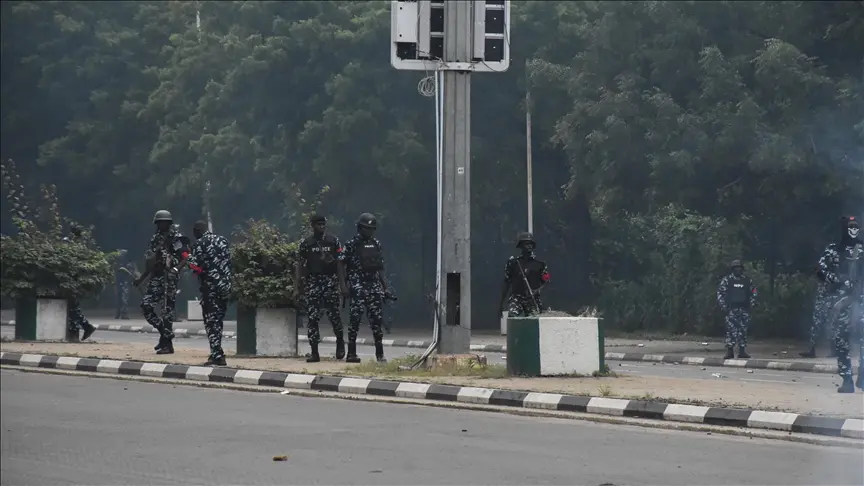
The past five days have been extremely challenging for Nigeria and its economy amidst hunger protests.
A wave of security red alerts has swept through states, particularly in the North West of Nigeria.
Authorities have documented cases of property destruction and shop looting in Kaduna, Plateau, and Bauchi as criminals exploited the protests for their own gains.
Incidents of rioters wielding Russian flags have been reported in Abuja and other Northern regions, including Kano State where a tailor responsible for creating the flags has been arrested.
The Russian Embassy in Nigeria has denied any involvement in the display of their flag during the protests.
Despite unclear motives, General Christopher Musa, the Chief of Defence Staff, deemed the display of Russian flags in Nigeria as treasonable and vowed to apprehend those responsible.
The escalation of violence on the fifth day of protests, marked by the #endbadgovernance hashtag, led to Bauchi, Kaduna, and Plateau states enforcing 24-hour curfews.
Earlier, Borno, Kano, Katsina, Jigawa, and Zamfara states had also declared 24-hour curfews in affected areas to prevent further chaos.
The imposition of curfews in various states has exacerbated the economic challenges faced by the nation.
With the economy already on a downward trend, the introduction of curfews in states has pushed the country’s economy closer to a collapse.
The Association of Small Business Owners of Nigeria (ASBON) estimates a loss of around N600 billion over the past five days due to the unrest.
Prior to this, the Center for the Promotion of Private Enterprise had warned of potential daily losses of N400 billion to the protests.
The continuous reports of violent disturbances and widespread fear across Nigeria are causing heightened concerns among investors.
Aside from the loss of lives and property damage, investors at the Nigerian Exchange Limited witnessed a drop of N92 billion by the end of Monday’s trading session.
A similar trend was observed in the Nigeria Eurobond market, with a significant sell-off in the dollar-denominated bond amidst the ongoing protests and uncertainties.
These economic challenges persist despite a call from President Bola Ahmed Tinubu to halt the protests and engage in dialogue with the government during his Sunday address.
Business Slowdown in Abuja
Major businesses in Abuja were operational on Monday, but with limited customer traffic.
A survey at Wuse Market indicated reduced business activities with concerns over safety dampening patronage levels.
In areas like Banex Plaza, Dutse Market, and Utako Market, a similar scenario of slow business was observed.
Banks in the capital city also operated on a reduced scale with limited services available to customers.
Prolonged Fuel Queues in Abuja, Niger, and Nasarawa
Most filling stations in Abuja, Nasarawa, and Niger States experienced challenges in dispensing Premium Motor Spirit (PMS) leading to long queues at the few operational stations such as those along Kubwa Expressway managed by the Nigerian National Petroleum Company Limited.
The Independent Petroleum Marketers Association of Nigeria attributed the fuel scarcity to disruptions in truck movements caused by the ongoing protests.
Government Commitments Need to Reflect in Food Price Reduction – Idakolo
Financial Analyst and CEO of SD & D Capital Management, Gbolade Idakolo, emphasized the importance of governments at all levels engaging with protesters to address their demands effectively.
He urged for tangible actions to alleviate the citizens’ suffering, especially in reducing food prices, rather than just making promises.
Idakolo called for prompt and meaningful dialogue between the government and demonstrators to facilitate real change and address the pressing issues affecting the populace.
Suspending Protests Essential to Prevent Nigeria’s Economic Deterioration – CPPE
The Director of the Centre for the Promotion of Private Enterprise (CPPE), Muda Yusuf, highlighted the urgent need to end the protests to safeguard Nigeria’s economy from further decline.
Yusuf emphasized the adverse impact of prolonged demonstrations on economic activities, particularly for private sector-dependent businesses that rely on daily transactions for survival.
He stressed the importance of constructive engagement between all stakeholders to restore confidence, enable economic recovery, and prevent deeper economic repercussions.
Dr. Uju Ogunbunka, the President of the Bank Customers’ Association of Nigeria, echoed similar sentiments, expressing concerns over the protests’ detrimental effects on business operations and economic growth.
He emphasized the need for a swift resolution to mitigate the economic fallout in the affected states and the nation as a whole.
